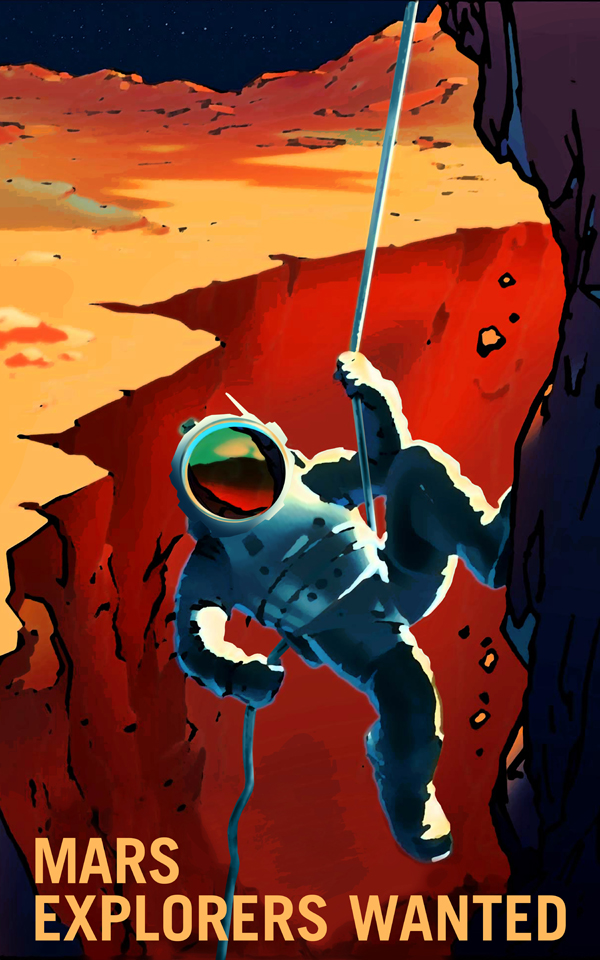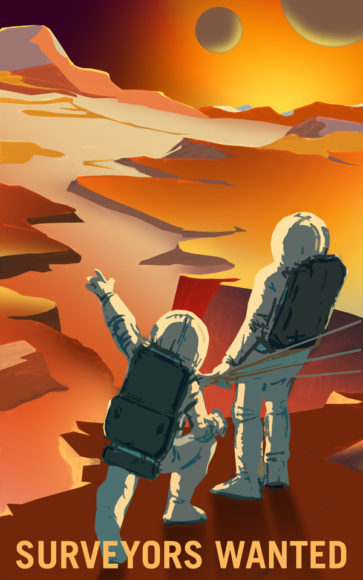Do You Want To Go To Mars?
Back in 1964, when I first read Red Planet by Robert A. Heinlein, I decided my goal in life was to get to Mars. I was 12. When Mariner 4 whizzed by Mars taking crude images in July 1965, showing the red planet was more like the Moon than science fiction, I was disappointed, but I still wanted to go. I grew up with Projects Mercury, Gemini, and Apollo. Sputnik flew the month after I started first grade, and Apollo 11 landed the month after I finished the twelfth grade. I assumed Americans would be on Mars before 1980, and colonization would start before I was too old to go. I don’t think I was alone having this dream. It was impossible for me to imagine in 1972 that humans would never leave Earth orbit for decades.
A warm day on Mars is what we’d call cold here on Earth, and a cold day on Mars is what we’d call hell. We’re now all afraid of getting too many X-rays, but living on Mars would cook our gonads in constant radiation. And only a geologist could admire the scenery of the fourth planet. So why do so many dream of going to Mars?
 NASA just announced a series of posters advertising for jobs on Mars. There seems to be more excitement in the 2010s about Mars than anytime since the 1960s. Elon Musk has become the D. D. Harriman of Heinlein’s imagination, the man who is selling Mars. The Martian by Andy Weir and its movie version has inspired millions to daydream about adventures on Mars even though Mark Watney had one wretched experience after another. Like Dorothy in Oz, he just wanted to go home. Thousands of people applied to join Mars One, a proposed Martian colonization scheme that involves one-way trips. What is so alluring about Mars that some people are willing to give up everything?
NASA just announced a series of posters advertising for jobs on Mars. There seems to be more excitement in the 2010s about Mars than anytime since the 1960s. Elon Musk has become the D. D. Harriman of Heinlein’s imagination, the man who is selling Mars. The Martian by Andy Weir and its movie version has inspired millions to daydream about adventures on Mars even though Mark Watney had one wretched experience after another. Like Dorothy in Oz, he just wanted to go home. Thousands of people applied to join Mars One, a proposed Martian colonization scheme that involves one-way trips. What is so alluring about Mars that some people are willing to give up everything?
For those of us who dream of moving to Mars, have you ever analyzed why you want to go? Looking back to my twelve-year-old self, I have to say reading Heinlein was my first motivation, but is fiction really a good justification? And if I had known about the details of how the astronauts of Project Gemini ate and shat in space for two-weeks, I would have given up my ambition back then. If I’m honest with myself, I know I never had the Right Stuff.
I think all adolescents want to escape their situations, and mine included alcoholic parents who dragged my sister and I around the country in their own restless search for greener pastures. It’s no wonder I would have gladly gone all the way to Mars to find a life of my own. Science fiction was my escape, my positive therapy for what should have been a psychologically damaged childhood. Science fiction and rock & roll were my trip to Mars, converting an adolescence I should have suppressed to a time I nostalgically cherish.
When Red Mars by Kim Stanley Robinson came out in 1993, my Mars mania reignited. Then when The Case for Mars by Robert Zubrin showed up a few years later, with a very practical plan for getting to Mars, I got even more excited. By then I had given up any naïve dream of going to Mars myself, but I finally had hope again that humans would go. That was twenty years ago, and we’re still doing endless 90-minute laps around the home world.
 I believe Elon Musk is an unrealistic optimistic about how to get to Mars, but I hope I’m wrong. I know the Mars One people are clueless, but I wish them well. There’s a practicality that comes with getting old. I’m glad the young aren’t infected. We need foolish people to do impossible things. But I’ve reached an age where I now question the value of going to Mars. I’m not sure space is suited for humans, but it is perfect for machines.
I believe Elon Musk is an unrealistic optimistic about how to get to Mars, but I hope I’m wrong. I know the Mars One people are clueless, but I wish them well. There’s a practicality that comes with getting old. I’m glad the young aren’t infected. We need foolish people to do impossible things. But I’ve reached an age where I now question the value of going to Mars. I’m not sure space is suited for humans, but it is perfect for machines.
And, if we do want to adapt humans to space, I think our starting place should be the Moon, not Mars. The Moon is three days away, and a perfect place to construct the self-sufficient industrial city to launch human space exploration of the solar system and beyond. If Homo sapiens can’t adapt to living on the Moon, going to Mars will be pointless. But if we can thrive on the Moon, Mars will be easy.
There’s one very important factor about those posters from NASA – they’re promoting jobs that involve long term stays. Going to Mars, or the Moon, can’t be about planting the flag. I didn’t understand the value of work as a kid. Space travel was a thrill. Living in space really means working in space. I just wanted to hop a rocket and escape into fictional fantasies. The people who truly want to live in space need twenty years of relentless preparation, and then will work 15-hour days on the final frontier. Pioneers don’t waste much time reading science fiction, playing video games, or enjoying VR.
Of course, such gritty self-evaluation makes me wonder about why I read science fiction. It’s still escapism. It’s now nostalgia. But it’s also a kind of hoping that humans will adapt to living in space. Where does that desire come from? Why is it important that our species go to Mars? Species have habitats. Why should we create new habitats for ourselves? Especially ones so tremendously ill-suited for our biology? What if fish wanted to live on land? Wait, some did.



















 Full Details
Full Details


2 Comments
-If Homo sapiens can’t adapt to living on the Moon, going to Mars will be pointless.-
Not necessarily true. The moon’s gravity is much lower than Mars, so there’s likely to be physiological differences there. Very low gravity is an issue over long time frames, and I’m not sure if the moon has enough gravity to fix that. But your point about the moon as a training step is valid.
Stephen, we know the microgravity of the space station is an issue, but we don’t know if 1/6th gravity of the Moon, or 1/3rd gravity of Mars would be. But we need to find out. However, many people want to colonize asteroids or moons, so we’re hoping lower gravity won’t be an issue. Plus many others want to build space habitats, which also will have fractional normal gravity. It will be interesting to see if humans can adapt to lower gravity.
We also have to adapt to higher levels of radiation, but living underground might solve that. Constructing underground cities on the Moon will be a good test.
Also, learning to “live off the land” will be important. The Moon has many of the elements we need to create a self-sustaining colony, just not in the proportions we’re used to on Earth. In the long run it won’t be practical to always take from the Earth, especially at such high delta-v costs. However, it might be practical to get the missing elements from elsewhere in the solar system. The low gravity of the Moon makes it a great place to travel to and from.
Sorry, the comment form is closed at this time.